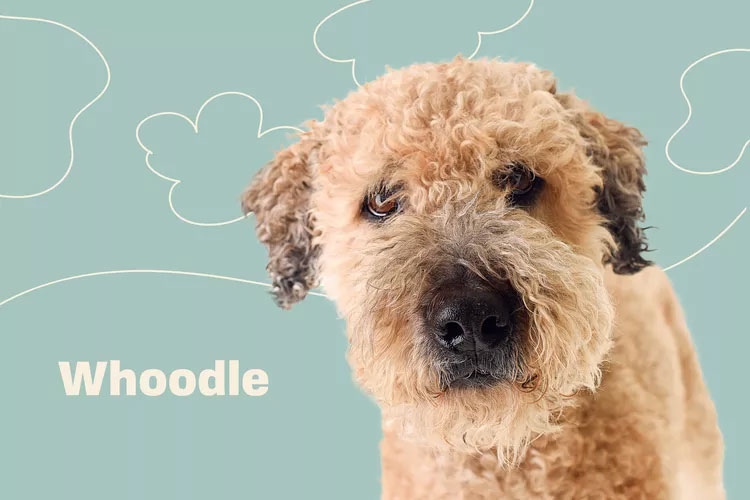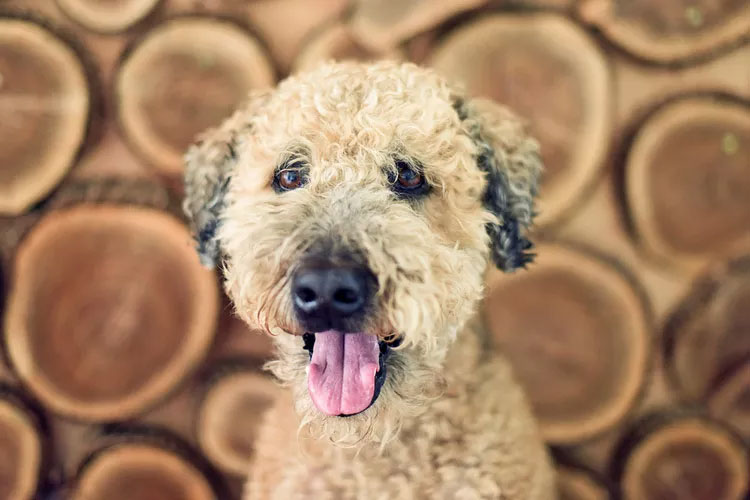
Whoodle Overview
| OFFICIAL NAME | Whoodle |
| COMMON NAME | Whoodle |
| PET HEIGHT | 14 to 20 inches |
| PET WEIGHT | 20 to 45 pounds |
| LIFESPAN | 12 to 15 years |
| GOOD WITH | children, dogs, families |
| TEMPERAMENT | anxious, friendly, outgoing |
| INTELLIGENCE | high |
| SHEDDING AMOUNT | infrequent |
| EXERCISE NEEDS | high |
| ENERGY LEVEL | hyper |
| VOCAL LEVEL | frequent |
| DROOL AMOUNT | low |
| BREED GROUP | hybrid |
| BREED SIZE | medium (26-60 lbs.) |
| COAT LENGTH | curly |
| COLORS | black, cream, fawn, gold / yellow, gray, red, white |
| PATTERNS | bicolor |
| OTHER TRAITS | apartment-friendly, hypoallergenic, loves water, requires lots of grooming |
As a hybrid dog, the whoodle combines the smarts of a poodle with the friendliness of a soft-coated wheaten terrier. These medium-sized dogs make wonderful family pets, but they have lots (like, lots) of energy and always want to be on the go.
These curly crossbreeds answer to many names—you might see whoodles commonly referred to as sweatenpoos, wheatendoodles, wheatenpoos, or sweatendoodles. No matter what you call them, this hybrid has grown in popularity because of their "hypoallergenic" coat.
If you're dedicated to keeping up with her ample energy and grooming needs, the whoodle could be a good friend for your family.
Appearance
Whoodles range from a small-sized breed (think 20 pounds) to medium (maxing out around 45 pounds), depending on the stature of their poodle parent. Poodles come in three sizes—toy, miniature, and standard—while soft-coated wheaten terriers usually weigh 30–40 pounds. The poodle parent's specific breed will impact the size of their whoodle puppies.Their poodle parent also influences a whoodle's color. While soft-coated wheaten terriers have fur that's always shades of fawn, cream, or gold, a poodle can be practically any color. Because of this, a whoodle can have a wheat-colored coat or be anything from red to black.
Speaking of the whoodle coat: This breed is known for their unusual fur that's silky, curly, and sheds less than other dogs. No dog is truly hypoallergenic, but the whoodle's low-shedding locks can be a good fit for families with allergies. But even with a low-allergen coat, the whoodle's fur requires a lot of upkeep. Their silky hair grows quickly and is prone to matting, so they need frequent bathing and combing.
Temperament
Whoodles inherit traits from two highly intelligent and energetic breeds. This makes them a wonderful pet for active families that have time to indulge their pup's need for entertainment. In addition to being highly active, the whoodle is a fast learner and can learn tricks worthy of a circus performer.But because whoodles can be rather rambunctious, owners should focus on positive reinforcement training to teach them manners. Some are motivated by treats, while others are driven by attention and lavish praise for good behavior. Hannah Godfrey, BVetMed, MRCVS, says this breed is prone to excitement and distraction, so owners will need to practice patience during their whoodle's puppy training.
"Whoodles are active, friendly, and intelligent dogs that can thrive in a family environment due to their energetic and playful nature, as well as their conservative size," Godfrey says. "However, all that intelligence does not necessarily mean that training them is a simple task, nor does it make them an easy first-time dog."

As affectionate dogs, whoodles love their humans and can be prone to the same separation anxiety seen in poodles. To prevent this, whoodle puppies should be socialized and never left home alone for too long. She's a good fit for families with children and other doggy pals. But take note: Soft-coated wheaten terriers have a high prey drive, so make sure your whoodle is introduced to smaller animals—cats, bunnies, or gerbils—during her formative puppy years to ensure a healthy cohabitation.
Living Needs
This medium-sized breed can live happily in apartments as long as owners give them enough daily physical activity. Whoodles desire daily activity with their humans and other animals; they love long walks, dog puzzles, swimming, or playing games with their favorite person.Though you shouldn't leave your pup alone for long, that doesn't mean they want you to just lie around the house with them! Most whoodles would prefer to join you for nearly any activity. As an extremely affectionate hybrid, they're happiest when receiving attention and as long as they're well-trained and socialized, whoodles make easy-going companions for almost any situation.
While known for their smarts, whoodles can carry streaks of independence and be rather strong-willed. This enthusiasm means they're known for jumping on people for attention. Thankfully, if your whoodle is patiently trained with positive reinforcement methods and given outlets for her energy, she can learn to have good manners and be a happy, agreeable pet.
Care
Whoodles are adored for their curly coats that are silky soft to the touch—but those coats require a lot of upkeep. She inherits a coarse, curly double-coat from the poodle and a silky single-coat from the wheaten terrier. This combo gives her a tangle-prone coat that, at minimum, will need daily brushing and combing.Owners should also be prepared to invest in a groomer for professional bathing and coat care. Ani Corless, founder of Luxury Groomer in New York City, says bathing a whoodle should be left to professional groomers because water can add (and worsen!) any matts in her curly coat.
"The softer the coat, the more maintenance," Corless says. "You're adding curls to a very soft coat, which equals matts. Expect to brush and comb every day."
The tangly coat can be amplified by the whoodle's need for an active lifestyle and need for outdoor exercise. But, if owners are ready to embrace the high-maintenance coat, these quick-to-learn dogs make devoted companions.
Health
This breed typically lives between 12–15 years, though miniature whoodles may have longer lifespans than those who are larger, such as the standard whoodle. As a hybrid dog, they can inherit the health problems seen in poodles and soft-coated wheaten terriers, depending on their specific genetics.Whoodle owners should be aware of the poodle's predisposition for hip dysplasia, Addison's disease, and eye problems, as well as how the wheaten terrier can suffer from protein-losing nephropathy and protein-losing enteropathy.

Though poodle hybrids, including the whoodle, are increasing in popularity, they're not recognized by the American Kennel Club and do not have a specific breed standard or national club. Because there are no formal breeding regulations for a whoodle, aspiring owners can run into problems when they get an animal from an unlicensed breeder or a commercial dog breeding facility that can prioritize profit over the dogs' health.
To avoid taking home an unhealthy dog, potential owners should only work with reputable breeders who have paired multiple generations of whoodles. It's also important that the breeders share data on health screenings, have verifiable health certificates, and allow the potential owners to meet the parent dogs. As a general rule, potential owners should avoid breeders who sell multiple mixed breeds, offer specific wait times for puppies, or are difficult to contact.
History
The exact origin of the whoodle is unknown. Like many poodle crossbreeds, this dog was likely developed around the 1980s as pet owners began seeking more variations of low-allergen dogs that were part poodle, such as the goldendoodle or the Labradoodle. In the world of poodle hybrids, the whoodle remains a lesser-known breed.The man credited with the explosion of popularity around hybrid dogs, Wally Conron, actually expressed regret for developing the Labradoodle because he realized that "unethical, ruthless people" would "breed these dogs and sell them for big bucks."
While the whoodle was likely caught up in the designer dog era, parent dogs of the whoodle have long histories. As a German dog breed, poodles were designed as water retrievers for duck hunters. The other genetic half of the whoodle, the soft-coated wheaten terrier, is an Irish breed who was employed as exterminators to rats on farms.
Fun Facts
Whoodles make wonderful service dogs and therapy dogs because of their friendly demeanor, quick-to-learn attitudes, and allergen-friendly coats.Though they're not the most popular "doodle" breed, whoodles are still making their mark on social media. Get your daily cute fix by following Kona, Moose, Meadow, and Mona.